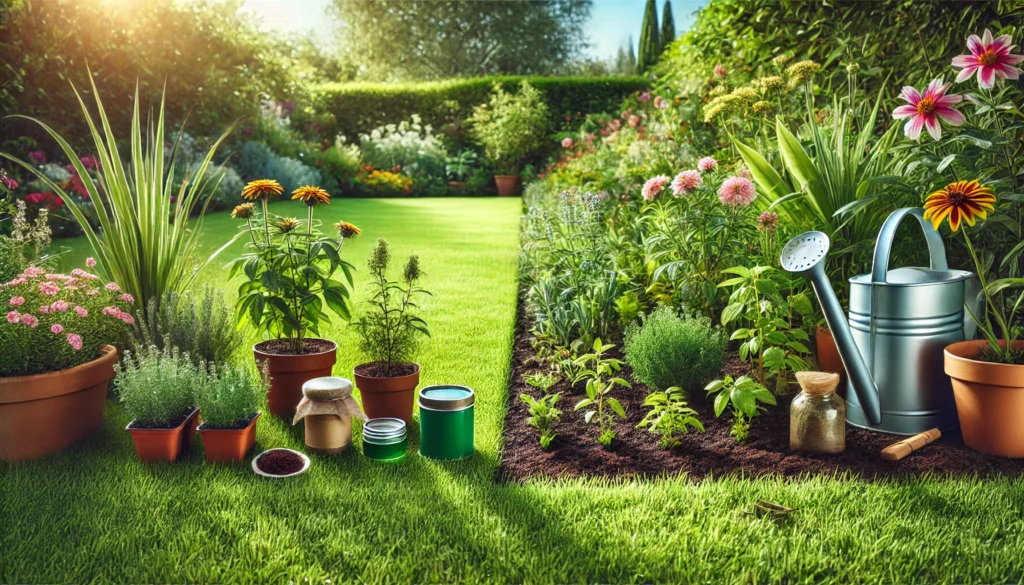Maintaining a lush, green lawn and a vibrant yard can be challenging, especially when pests threaten your outdoor oasis. While chemical pesticides offer quick solutions, they come with risks to the environment, pets, and your family. Switching to natural pesticides ensures effective pest control while promoting a safer, healthier outdoor space.
In this article, we’ll explore six eco-friendly natural pesticides that are easy to use, organic, and perfect for maintaining your yard’s health without compromising the environment.
1. Neem Oil: The Organic Powerhouse
Neem oil, derived from the seeds of the neem tree, is a versatile and highly effective natural insect repellant. This organic solution targets a wide range of pests, including aphids, whiteflies, and beetles, without harming beneficial insects like bees and butterflies.
How It Works:
Neem oil disrupts the life cycle of insects by affecting their feeding and reproduction. Its active compound, azadirachtin, acts as both a repellent and a growth inhibitor.
Application Tips:
- Mix 2 tablespoons of neem oil with 1 gallon of water.
- Add a few drops of liquid dish soap to help the mixture stick to plants.
- Spray directly onto affected areas in the early morning or late evening to avoid leaf burn.
Benefits:
- Safe for pets and children.
- Biodegradable and eco-friendly.
2. Diatomaceous Earth: A Natural Pest Barrier
Diatomaceous earth (DE) is a fine powder made from fossilized aquatic organisms. This natural pesticide is highly effective against pests with exoskeletons, such as ants, fleas, and slugs. The article from William Quarles (1992), mentions that Diatomaceous earth (DE) is a non-toxic insecticide used to protect stored products and control home and garden pests, making it popular among organic gardeners for its natural, non-toxic properties. Pest control operators (PCOs) appreciate DE for its ability to treat inaccessible areas like wall voids, while also addressing homeowner concerns about the use of poisons.
How It Works:
The abrasive texture of DE damages the protective outer layer of insects, causing them to dehydrate and die.
Application Tips:
- Sprinkle a thin layer of food-grade DE around the perimeter of your lawn and garden beds.
- Reapply after heavy rain for continuous protection.
Benefits:
- Completely natural and non-toxic.
- Effective for long-term pest control
Here is a detailed article I wrote on Diatomaceous Earth: A Natural Pest Barrier.
3. Garlic Spray: Nature’s Repellant
Garlic is more than just a kitchen staple; it’s a potent natural insect repellent that deters a wide range of pests, including mosquitoes, aphids, and caterpillars.
How It Works:
Garlic emits a strong odor that overwhelms pests’ sensory receptors, making your yard an unappealing place for them.
Application Tips:
- Blend 10 cloves of garlic with 1 liter of water.
- Let the mixture steep overnight, then strain and dilute with 1 gallon of water.
- Spray generously on plants and lawn areas.
Benefits:
- Safe for edible plants.
- Affordable and easy to prepare at home.
4. Soap and Water Spray: A DIY Solution
A simple mixture of soap and water can work wonders as an organic pesticide, especially against soft-bodied insects like aphids, spider mites, and whiteflies.
How It Works:
The soap disrupts the protective outer layer of insects, leading to dehydration and death.
Application Tips:
- Use 1 tablespoon of liquid dish soap (preferably biodegradable) per gallon of water.
- Spray directly onto infested areas, focusing on the undersides of leaves where pests often hide.
Benefits:
- Gentle on plants when used correctly.
- Non-toxic and environmentally safe.
5. Coffee Grounds: Dual-Purpose Yard Care
Used coffee grounds are not just great for compost; they also serve as a natural pesticide and fertilizer. They repel pests like ants, slugs, and snails while enriching your soil with nitrogen.
How It Works:
The strong smell of coffee repels pests, while its texture deters crawling insects.
Application Tips:
- Sprinkle coffee grounds around plant bases or create a perimeter around your yard.
- Combine with other organic materials to enhance compost benefits.
Benefits:
- Eco-friendly way to recycle kitchen waste.
- Boosts soil health while deterring pests.
6. Companion Planting: Nature’s Pest Control
Companion planting involves strategically growing pest-repellent plants alongside your lawn and garden. Plants like marigolds, lavender, and basil naturally deter pests while enhancing your yard’s aesthetic appeal.
How It Works:
The scent and natural compounds in these plants repel pests and attract beneficial insects, creating a balanced ecosystem.
Examples of Companion Plants:
- Marigolds: Repel nematodes and aphids.
- Lavender: Keeps mosquitoes and moths at bay.
- Basil: Protects against flies and mosquitoes.
Benefits:
- Chemical-free pest control.
- Enhances biodiversity in your yard.
Why Choose Natural Pesticides?
Using natural pesticides for your lawn and yard care offers numerous benefits:
- Environmental Protection: Reduces harmful chemical runoff into waterways.
- Safety: Non-toxic solutions ensure the well-being of pets and children.
- Sustainability: Encourages eco-friendly gardening practices.
Tips for Effective Natural Pest Control
- Regular Monitoring: Inspect your yard regularly for signs of pest activity.
- Integrated Pest Management (IPM): Combine natural methods for a comprehensive approach.
- Proper Application: Follow recommended dosages to prevent plant damage.
- Maintain Plant Health: Healthy plants are less susceptible to pest infestations.
Conclusion
Transforming your lawn and yard care with these six eco-friendly natural pesticides is a step toward a sustainable, safe, and thriving outdoor space. From the multipurpose neem oil to the aromatic protection of companion plants, these methods offer effective pest control without the harmful side effects of synthetic chemicals.
Ready to create a greener, healthier yard? Start incorporating these organic pesticides into your routine and experience the difference nature can make.
For more tips on sustainable lawn care, bookmark this article and share it with friends passionate about eco-friendly living!
Also, you may like reading another relevant article I wrote: Eco-Friendly Lawn Care: A Green Choice for a Healthier Planet.
Let’s play our part to keep the Earth safe for our future generations!
Disclaimer:
The information provided in this article is for general guidance only. Always test natural pesticides on a small area of your plants or lawn before full application to ensure compatibility. While these methods are eco-friendly and safe, consult a professional if you are dealing with severe pest infestations or specific plant care needs.


